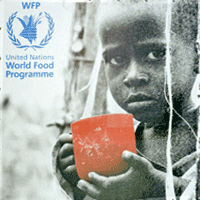|
 Heads of major international organisations today made a concerted declaration to jointly tackle the ongoing food crisis. Chairs of the United Nations (UN), the World Bank and the World Trade Organization (WTO) addressed a press conference at the Swiss capital of Bern after joint talks and outlined several measures to mitigate and resolve the current situation that is threatening to engulf millions around the world. Heads of major international organisations today made a concerted declaration to jointly tackle the ongoing food crisis. Chairs of the United Nations (UN), the World Bank and the World Trade Organization (WTO) addressed a press conference at the Swiss capital of Bern after joint talks and outlined several measures to mitigate and resolve the current situation that is threatening to engulf millions around the world.
Earlier this month, at a global conference of experts called by British prime minister Gordon Brown, Josette Sheeran of the UN's World Food Programme (WFP) had described the current food crisis, a ''silent tsunami'' that threatened to plunge more than 100 million people on every continent into hunger. She is also one of the prominent attendees at this two-day meeting that ends today. (See: Tsunami of hunger threatening 100 million people worldwide: World Food Programme) Of the many announcements made at the press conference while the meeting is in progress, the most notable was one regarding the direct involvement of the UN Secretary-General. Ban Ki-moon said he would chair a new UN task force that will comprise of the heads of UN specialized agencies, funds and programs, the International Monetary Fund, the World Bank and the UN Secretariat to counter the effects of the food rise. The food crisis is an ''unprecedented challenge'' that has ''multiple effects on the most vulnerable,'' Ban told the press conference today. ''We must feed the hungry,'' and ''full funding'' is needed, he said, referring to the $755 million appealed for in February to close a budget gap induced by rising food prices at the UN's WFP. ''Without these funds we risk the spectre of famine, malnutrition and unprecedented social uprising,'' he said. He said that the crisis might also lead to something worse. ''This crisis could result in a cascade of others ... and become a multidimensional problem affecting economic growth, social progress and even political security around the world.'' He that the UN's Food and Agriculture Organization has a $1.7 billion plan to provide seeds for farmers in the world's poorest countries. Rising prices are causing a budget shortfall of $755 million for the World Food Programme, WFP Executive Director Josette Sheeran said. So far it had received 62 per cent of this amount, which will allow it to buy as much food as it could purchase last year. The World Bank also made its presence felt at the meet and pledged double it's lending to agriculture in Africa over the next year to $800 million, an act its president Robert Zoellick called an ''integrated international response'' to the crisis. He also encouraged other donors ''to act now'' while adding that ''for two billion people, high food prices are now a matter of daily struggle, sacrifice and for too many, even survival.'' WTO director general Pascal Lamy also said that the organisation plans to help solve the crisis by ''reinforcing discipline in trade distorting subsidies''. ''It's well known that trade-distorting farm subsidies from rich countries have damaged food production in developing countries,'' he added, while pushing for negotiations to be concluded on Doha trade talks. The World Bank estimates food prices have risen by an average of 83 per cent in the past three years. A range of factors has been blamed for the food crisis, including poor harvests, rising oil prices and steep growth in demand from developing countries. In the long-term, the UN chief acknowledged that there is an "urgent necessity to address structural and policy issues that have contributed to this crisis as well as the challenge posed by climate change." "Further research must be undertaken on the impact of diversion of food crops to bio-fuel production and all subsidies to bio-fuels should be reviewed," he added. The UN's special rapporteur on the right to food, Jean Ziegler, has called biofuels a "crime against humanity" and urged their production be immediately abandoned. Biofuels are touted as a way to limit and reduce greenhouse gas emissions, held responsible for global warming, but since they are grown on land that would otherwise be used for food production, they have been increasingly blamed for soaring food prices.
|